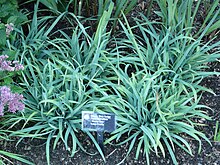
Dulichium is a monotypic genus of sedge containing the single species Dulichium arundinaceum, which is known by the common name threeway sedge. This is an aquatic or semi-aquatic plant of the lakes, streams, and ponds of the United States and Canada. It has a wide distribution across the two countries, though noticeably absent from the Dakotas and from the Southwestern Deserts.

Carex pensylvanica is a species of flowering plant in the sedge family commonly called Pennsylvania sedge. Other common names include early sedge, common oak sedge, and yellow sedge.
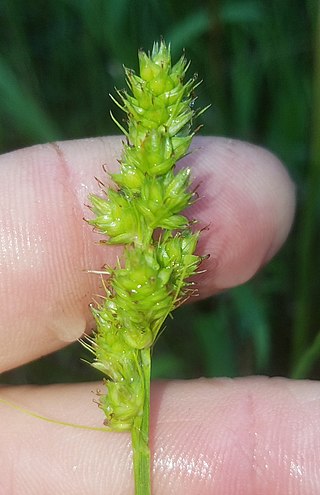
Carex austrina, known as southern sedge, is a species of sedge endemic to the southern and central United States.
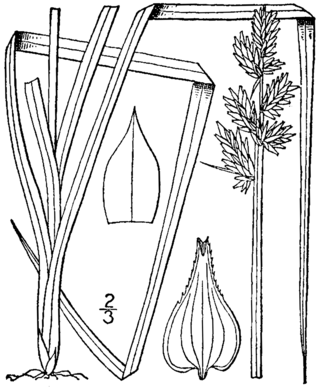
Carex conjuncta, known as soft fox sedge, is a species of sedge that was first formally named by Francis Boott in 1862. It is endemic to the central and eastern United States.

Carex morrowii, the kan suge, Morrow's sedge, Japanese grass sedge or Japanese sedge, is a species of flowering plant in the family Cyperaceae. It is native to central and southern Japan, and has been introduced to Belgium, Denmark and Austria.
Carex tereticaulis, also known as basket sedge, is a species of sedge of the family Cyperaceae that is native to southern parts of Western Australia, southern parts of South Australia, southern and eastern parts of New South Wales as well as north western and central Victoria and Tasmania. The Koori peoples know the plant as Poong'ort.

Carex viridula, known as little green sedge, green sedge, or greenish sedge, is a small flowering plant native to North America, Europe, Asia, and Morocco.

Carex stipata, variously called the prickly sedge, awl-fruited sedge, awlfruit sedge, owlfruit sedge, swamp sedge, sawbeak sedge, stalk-grain sedge and common fox sedge, is a species of flowering plant in the genus Carex, native to Canada, the United States, China, Korea, Japan, and Far Eastern Russia. It is a wetland obligate.

Carex supina, called the weak arctic sedge, is a species of flowering plant in the genus Carex, native to Alaska, western and central Canada, Minnesota, Greenland, central and eastern Europe, the Caucasus region, Central Asia, Siberia, the Himalaya, the Amur region, Manchuria, and Korea. It is often found in association with Festuca altaica and Poa glauca.

Carex tribuloides, the blunt broom sedge, is a species of flowering plant in the genus Carex, native to the eastern United States, eastern Canada, and Veracruz in Mexico, and introduced in Sweden. It is an important food for soras during their spring migration.

Carex tristachya, called the shiny-spike sedge, is a species of flowering plant in the genus Carex, native to south-central and southeast China, Korea, Japan, the Ryukyus, the Philippines, Borneo, and New Guinea. Its seeds are dispersed by ants.

Carex communis, the fibrous-root sedge, is a species of flowering plant in the genus Carex, native to central and eastern Canada and the central and eastern United States. Its seeds are dispersed by ants.

Carex dolichostachya is a species of flowering plant in the sedge genus Carex, family Cyperaceae. It is native to eastern Asia; central and southeast China, Taiwan, the Philippines, Korea, the Ryukyu Islands, and Japan. Its popular cultivar 'Kaga-nishiki' is sold in the US by the trade designation Gold Fountains.

Carex flaccosperma, the blue wood sedge, is a species of flowering plant in the family Cyperaceae, native to the south-central and southeastern US. Preferring to grow in wet, shady situations and deer resistant, it is recommended for shady areas in rain gardens.

Carex frankii, also known as Frank's sedge, is a widespread species of flowering plant in the family Cyperaceae, native to temperate eastern North America; Ontario, the central and eastern United States, and Coahuila, Mexico. Preferring to grow in wet, shady situations such as the edges of streams and ponds, and erosion resistant, it is recommended for rain gardens.

Carex haydenii, Hayden's sedge, is a species of flowering plant in the family Cyperaceae, native to eastern Canada and the north-central and northeastern United States. Preferring to grow in wet, shady situations, but able to tolerate full sun, it is recommended for rain gardens.

Carex radiata, the eastern star sedge, is a species of flowering plant in the family Cyperaceae, native to central and eastern North America. It is cultivated for its yellowish-green foliage and its relatively—for a sedge—showy flowers.
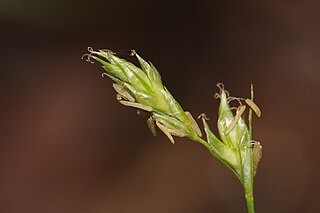
Carex deweyanaDewey's sedge, short-scale sedge, is a species of sedge native to Canada and the United States.
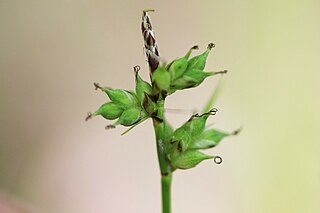
Carex peckii, Peck's sedge, Peck's oak sedge, or white-tinged sedge, is a species of sedge native to Canada and the United States.

Carex crus-corvi, the raven's foot sedge or crowfoot sedge, is a species of flowering plant in the family Cyperaceae. It is native to southern Ontario in Canada, and the central and southeastern United States, and it has been introduced to Belgium. A perennial reaching 90 cm (3 ft) and hardy to USDA zone 4, it is an obligate wetland species found in a wide variety of such habitats.
